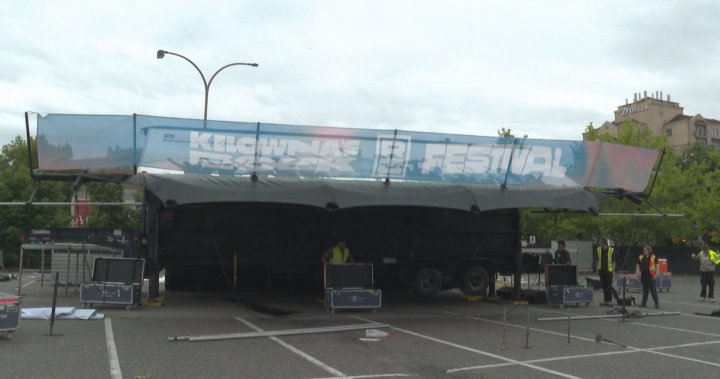The smell of mini-donuts mixes with the scent of sunscreen as I make my way through the crowd at Kelowna’s Prospera Place. A woman wearing a faded Trooper t-shirt bumps into me, apologizing with a smile that suggests we’re all friends here. That’s the magic of Rock the Lake—a festival that has become more than just a music event; it’s a celebration of Canadian identity through sound.
After a successful run this summer, organizers have announced that Rock the Lake will return in 2025 with an all-Canadian lineup that spans generations and genres, continuing its tradition of showcasing homegrown talent.
“We’ve always tried to celebrate Canadian music and the incredible artists our country has produced,” says GSL Group President Graham Lee, whose company operates Prospera Place and produces the festival. “For 2025, we wanted to double down on that commitment and create a truly Canadian experience.”
The festival, scheduled for August 8-10, 2025, will transform the area outside Kelowna’s downtown arena into a three-day celebration featuring some of the country’s most beloved musicians. While the full lineup remains under wraps, organizers promise a mix of legendary acts and contemporary artists who have shaped Canada’s musical landscape.
This focus on Canadian talent comes at a critical time for the domestic music industry. According to a 2023 report from the Canadian Independent Music Association, live music generates approximately $1.2 billion annually and supports thousands of jobs across the country. However, touring costs have increased by nearly 35% since the pandemic, making festivals like Rock the Lake crucial platforms for artists.
Local businesses have embraced the announcement. Emma Kirkland, who owns a coffee shop two blocks from the venue, tells me her sales triple during festival weekends. “It’s not just about the money, though,” she says, serving me an iced latte on her patio. “It’s about the energy these events bring to Kelowna. People from all walks of life coming together, celebrating music that has defined different chapters of their lives.”
The decision to feature exclusively Canadian artists also addresses growing conversations about cultural sustainability. As streaming platforms increasingly homogenize global music consumption, festivals that celebrate regional identity create important cultural counterbalances. Statistics Canada data shows that Canadian content regulations have been vital in nurturing domestic talent, with 25% of radio airplay dedicated to Canadian artists resulting in measurable industry growth over decades.
Walking along Kelowna’s waterfront after speaking with festival organizers, I watch tourists and locals alike enjoying the late summer sunshine. A street performer plays a guitar rendition of The Tragically Hip’s “Ahead By A Century,” and several passersby stop to listen, some quietly singing along.
This scene captures what Rock the Lake aims to cultivate—moments where music becomes a thread connecting strangers through shared cultural touchpoints. When I spoke with Kerry Erickson, who has attended the festival since its inception, she described how hearing bands like 54-40 and Honeymoon Suite transported her back to road trips with her parents in the 1980s.
“I’m bringing my daughter next year,” Erickson says. “She’s 16 and thinks Canadian music is just Drake and The Weeknd. I want her to understand there’s this whole lineage of amazing artists who paved the way.”
The festival’s economic impact extends beyond the weekend itself. Tourism Kelowna estimates that multi-day events like Rock the Lake bring approximately $3.5 million to the local economy through accommodations, dining, and retail spending. In a region still recovering from recent wildfire seasons that impacted tourism, these cultural events provide much-needed stability for seasonal businesses.
City Councillor Maxine DeHart emphasizes this point when I catch her at a community event. “These festivals create a ripple effect throughout our economy,” she explains. “Visitors don’t just attend the concerts—they explore wineries, shop downtown, and often extend their stays to experience everything the Okanagan offers.”
Environmental considerations have also shaped the 2025 planning. Organizers have committed to reducing the festival’s carbon footprint by implementing comprehensive recycling programs, encouraging public transportation, and working with vendors who prioritize sustainable practices.
As the sun sets over Okanagan Lake, casting long shadows across the city, I reflect on what makes Rock the Lake special in an increasingly crowded festival landscape. Perhaps it’s the authenticity of celebration—not just of music, but of a shared cultural heritage that transcends generations.
The festival’s announcement comes at a time when the Canadian music industry faces both challenges and opportunities. The Canadian Music Fund recently received a $25 million boost from the federal government to help artists recover from pandemic losses and adapt to changing consumption patterns. Festivals like Rock the Lake provide crucial platforms for established acts while creating pathways for emerging artists to connect with broader audiences.
When tickets go on sale later this year, they’ll likely move quickly. Previous iterations of the festival have sold out within weeks, drawing attendees from across British Columbia, Alberta, and beyond. The festival’s reputation for creating intimate experiences despite its growing size continues to be its strongest selling point.
As I prepare to leave Kelowna, a taxi driver named Raj tells me he’s already planning to take the weekend off next August. “I went this year just to see what it was about,” he says, navigating through evening traffic. “I ended up staying all three days. Those songs—they’re like old friends you forgot you missed.”
That sentiment captures the essence of what Rock the Lake 2025 promises: a musical homecoming that celebrates not just what it means to be Canadian, but what it means to be connected through cultural experiences that span decades and unite generations.






